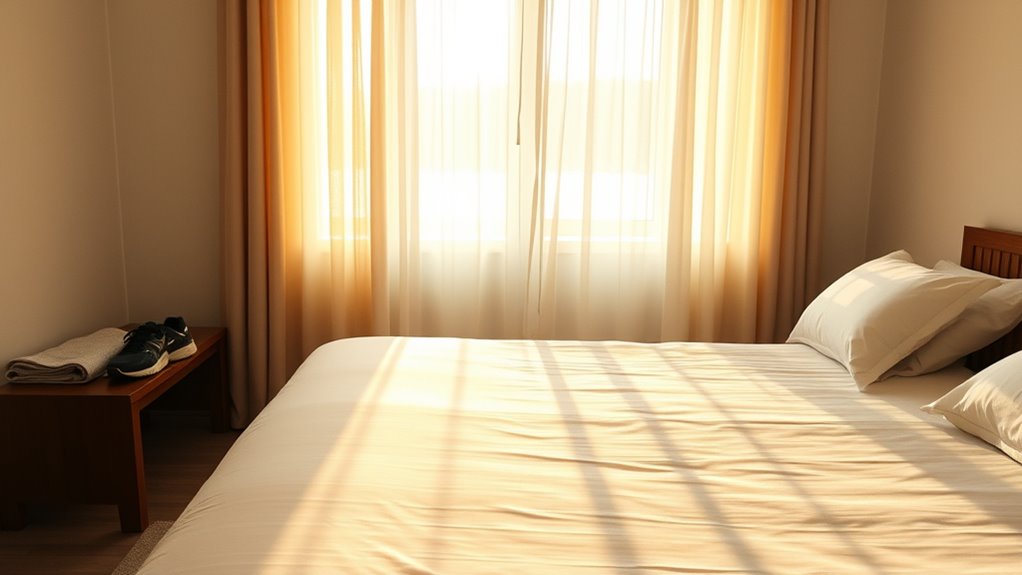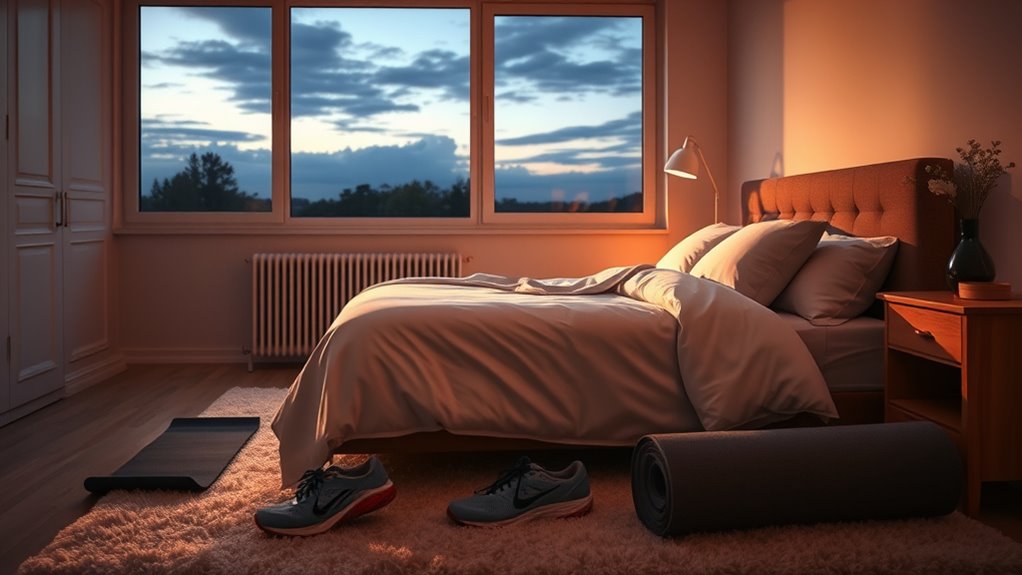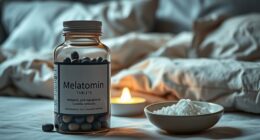Regular exercise can greatly improve your sleep quality by helping you fall asleep faster and enjoy deeper, more restorative rest. Engaging in moderate physical activity, especially earlier in the day, helps regulate your sleep cycles and promotes a natural shift into restful stages. It also reduces nighttime awakenings and enhances overall sleep patterns. To maximize these benefits, pay attention to exercise timing and intensity—continuing this balance can lead to more restful nights and healthier days.
Key Takeaways
- Regular exercise improves sleep quality by reducing sleep onset time and increasing deep sleep stages.
- Exercising earlier in the day supports natural temperature drops that facilitate sleep.
- Moderate aerobic activities enhance sleep duration and help regulate sleep cycles.
- High-intensity or late-night workouts may temporarily hinder sleep due to elevated adrenaline.
- Consistent exercise routines help stabilize the sleep-wake cycle, promoting better overall rest.

Regular exercise can considerably improve your sleep quality by helping you fall asleep faster and enjoy deeper, more restorative rest. When you’re physically active, your body undergoes changes that positively influence your sleep cycles, ensuring you progress smoothly through the different stages of sleep. These cycles, which include light sleep, deep sleep, and REM sleep, are essential for physical and mental recovery. Exercise promotes more consistent and balanced sleep patterns, making it easier for you to *shift* into the deeper stages of rest that restore your energy and boost your mood.
Regular exercise enhances sleep by promoting deeper, restorative rest and balanced sleep cycles.
One of the key factors that determine how exercise affects your sleep is exercise timing. If you work out too close to bedtime, you might find it harder to fall asleep because your body remains energized and your core temperature stays elevated. Conversely, exercising earlier in the day or at least a few hours before bed can help you wind down naturally. When you exercise during the day, your body’s temperature regulation gets a beneficial boost, which then drops at night, signaling your body that it’s time to sleep. This temperature drop encourages the onset of sleep and supports the natural progression through your sleep cycles.
The intensity and duration of your workouts also influence your sleep quality. Moderate aerobic activities, such as brisk walking, cycling, or swimming, tend to promote better sleep without overstimulating your nervous system. These exercises can help you fall asleep faster and spend more time in the deep sleep stages, which are *vital* for physical repair and memory consolidation. On the other hand, high-intensity workouts or exercising late in the evening might temporarily increase adrenaline levels and heart rate, making it harder to relax afterward. It’s best to schedule intense sessions in the morning or early afternoon to maximize their benefits for your sleep.
Consistency is another important aspect. Developing a routine that incorporates regular exercise not only improves your overall health but also helps regulate your sleep-wake cycle. Over time, your body learns to associate physical activity with sleep readiness, making it easier to fall asleep and stay asleep throughout the night. Remember, the goal is to find a balance—exercise should invigorate and energize you during the day, but not interfere with your ability to unwind and prepare for restful sleep at night. Adjusting your exercise timing and intensity based on your personal response can significantly improve your sleep quality, leading to more restorative nights and better overall well-being.
Frequently Asked Questions
Does Exercising Too Late Affect Sleep Quality?
Exercising too late, especially during evening workouts, can lead to sleep disruption. When you work out close to bedtime, your body stays energized, making it harder to fall asleep. The increased adrenaline and core temperature might delay your sleep cycle. To improve sleep quality, consider finishing intense exercise at least a few hours before bed. This helps your body wind down naturally and promotes better rest.
What Types of Exercise Are Best for Improving Sleep?
Imagine your sleep as a delicate garden needing nurturing. Yoga benefits act like gentle rain, calming your mind and easing tension before bed. Resistance training works as a sturdy fence, building strength and promoting deeper rest. Both types of exercise serve as tools to improve sleep quality. Incorporate these activities into your routine, and watch your sleep bloom like a vibrant garden, refreshed and revitalized each morning.
How Long Before Bed Should I Exercise for Optimal Sleep?
You should aim to finish your exercise at least 1 to 2 hours before bedtime for better sleep. Engaging in activities like bedtime stretching or evening yoga earlier allows your body to wind down, reducing adrenaline and cortisol levels. Avoid vigorous workouts close to sleep, as they can interfere with your rest. Giving yourself time to relax after exercising helps improve sleep quality and makes falling asleep easier.
Can Exercise Help With Insomnia or Sleep Disorders?
Think of exercise as a key that unfastens better sleep. It can help with insomnia and sleep disorders by reducing stress and promoting relaxation. Regular physical activity enhances meditation benefits by calming your mind, making it easier to drift off. Also, maintaining a good sleep environment is essential. When you combine exercise with a cozy sleep space, you create the perfect recipe for restful nights and healthier sleep patterns.
Is There a Difference in Sleep Benefits Between Cardio and Strength Training?
You might wonder if cardio vs strength training offers different sleep benefits. Cardio typically boosts your sleep quality by increasing your overall fatigue, helping you fall asleep faster. Strength training, on the other hand, can improve sleep depth and reduce nighttime awakenings through muscle recovery. Both are effective sleep improvement methods, but combining them may provide the best results. Listen to your body and find the routine that helps you sleep best.
Conclusion
Incorporating regular exercise into your routine can dramatically enhance your sleep quality, helping you fall asleep faster and enjoy deeper rest. You might wonder if your efforts are truly making a difference—rest assured, they are. By staying active, you’re not just strengthening your body but also nurturing your mind’s ability to relax. So, why not make exercise a daily habit and access the restful sleep you deserve? Your body and mind will thank you.









